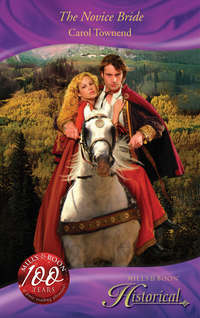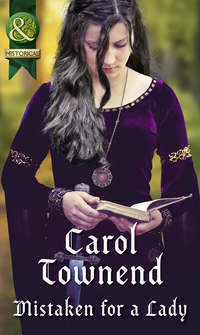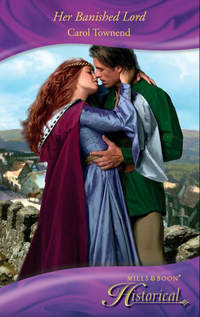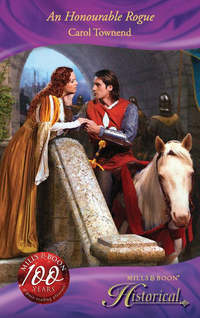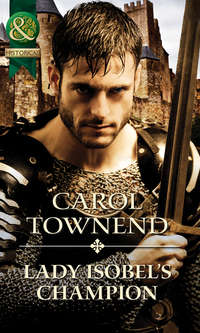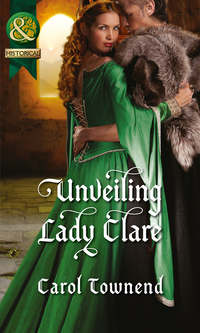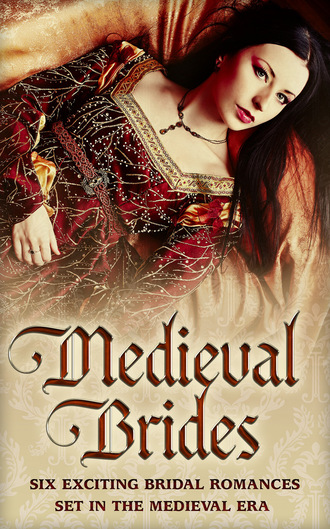
Полная версия
Medieval Brides
In no time Cecily was looking at strips of farmland that had been cut out of the woodland. Ahead, Adam reined in, and allowed them to draw level with him.
‘Familiar, my lady?’ Maurice asked.
‘Aye. Fulford Hall.’ She cleared her throat. ‘It’s very close.’
‘I’ll take it from here, Maurice,’ Adam said, taking her reins from his squire. He pulled off his helm, looped the strap round the pommel of his saddle and pushed back his coif. ‘See to the horses, will you?’
‘Aye, sir.’ Maurice spurred on ahead.
Adam’s profile was stern. And then he looked at her and smiled. But it seemed Cecily was getting to know him. His smile was false.
‘Sir?’
‘Be my guide, will you? When we took possession we were hard pushed to make out a word that was said to us, and I would know the name and station of everyone on this holding—down to the last soul. You swore to be my guide, remember? And I want you to teach me English.’
When we took possession. Cecily swallowed and nodded, lowering her gaze to hide a flash of anger. She did not know what she had expected to feel at her homecoming, but she had not thought to feel anger. Could he not allow her a few moments to come to terms with the changes—parents and brother gone, sister fled? Callous, cold, insensitive brute.
But then, surprisingly, anger was pushed aside, for their horses were walking past the peasants’ field strips on the outskirts of Fulford village, and there was too much she wanted to see.
The woods had been cut back in the four years she had been away, and two whole new fields had been made. Each peasant’s strip was clearly marked out from his neighbours—ridge, furrow, ridge, furrow, ridge, furrow. As expected, the wheat field had been harvested, and several pigs were tethered there, rooting about in the stubble, digging, manuring, turning all to mud. The fallow field had turned into a sheep-pen, and the frost-scorched grasses and clover had been nibbled down to the bare earth.
Cecily frowned.
‘What is it? What’s wrong?’ Adam asked.
‘Too many animals,’ she told him, her frown deepening. The thatch on one farmer’s cottage needed repair; another had a door falling off its hinges. ‘Far too many. And the winter feed has not been cut.’
‘Explain, please?’
Cecily sent him a sharp look, wondering how deep his interest went. Did he intend to strip Fulford of what riches it possessed, leaving it so impoverished that it would no longer be able to sustain itself? Or was he intending to husband her father’s land carefully? Was Adam Wymark a locust, or a good steward?
‘I need to know,’ he said, his expression earnest. ‘I’m a soldier, not a farmer. I was brought up in a town; there’s much I must learn.’
She nodded, prepared—for the moment—to give him the benefit of the doubt. ‘It’s November,’ she said. ‘Hard enough to keep more than a handful of animals alive through the turn of the year, even with plenty of winter feed—but that lot is far too many. They’ll starve, and the breeding stock will be weakened. They should have chosen the best animals to keep, and the rest should have gone to slaughter.’ Seeing she had his attention, she continued, waving at the cottages. ‘Look at those houses. People will be freezing come January. It’s in no one’s interests if half the village succumbs to lung fever.’
Adam gave her a lop-sided smile, and this time it did reach his eyes. ‘Cecily, I can work that one out for myself.’
‘I can’t think what Godwin’s about—’
‘Godwin?’
‘The reeve—at least he was reeve four years ago. He was old then. Perhaps he’s ill.’ She scowled meaningfully at him. ‘Or maybe he’s dead too.’
His smile fell away. ‘Who lives in that cottage?’
‘The one that’s lost most of its thatch? Oswin and May.’
‘And that one?’
‘Alfred. Poor Alfred lost his wife when his son Wat was born. Wat is my age.’ And Wat is simple, she thought, damaged at birth. She said nothing of this to Adam. Alfred’s cottage looked abandoned. What had happened to him? As a farmer, Alfred had not been one of her father’s housecarls, but perhaps he had formed part of the local levy, and had been drummed up to go to Hastings with billhook or pitchfork. If something had happened to Alfred, who was caring for Wat?
They drew level with the mill. Its wheel was larger than a tall man. Water gushed noisily into the channel, machinery clanked and banged, wooden cogs creaked and rattled. The hoist shutters on the upper floor were closed to keep out the November chill, and no one came to the door to watch their passing—but then the sound of their horse’s hooves was no doubt muffled by the mill workings.
‘How do you call this in English?’
‘It’s a mill.’
‘Mill,’ Adam said carefully, trying the word out. ‘Mill.’
Did he really intend to learn English? Covertly, hungrily, Cecily examined his profile, baffled by a most powerful need to lock every last detail of him safely in her mind—from the precise colour of his dark hair, so like the wing of a blackbird, to the perfect straightness of his nose. She was gazing with something that felt oddly like longing at the compelling curve of his lips when he glanced across at her. Hurriedly, she dropped her gaze and lurched into speech.
‘The miller’s name is Gilbert. He’s married to Bertha, and when I left they had a girl called Matty, and two boys, Harold and Carl. Matty should be about fourteen and the boys would be eleven and twelve by my reckoning.’
Adam nodded. ‘Mill,’ he repeated.
They rode on. The noise of the mill diminished as the village church, a simple thatched building with a cross on the roof ridge, rose up in front of them.
‘And this building? What is the English word?’
‘The word is church.’
‘Church,’ Adam murmured. ‘Church.’ He reverted to Norman French. ‘It’s wooden, like the cottages and the mill. There are no stone buildings in Fulford. At my home in Brittany it is the same; in the main only great lords’ castles and cathedrals are built in stone.’
Absently, Cecily nodded. Her eyes were drawn to the glebeland next to the church, to the graveyard. And there, through the split-rail fence, she found what she was looking for—a wreath of evergreens someone had placed on some freshly turned earth. Her mother’s grave?
Her hands jerked on the reins; her eyes filled. Quickly averting her head, she forced her gaze past the cemetery, on to the priest’s house and Fulford Hall, which stood facing each other on opposite sides of the village green.
Tears ran hot down her cheeks once again, and the sheep-nibbled grass of the village green, trampled and muddied as it was by many horses’ hoofs, blurred and wavered like a field of green barley in a March wind. Swallowing down the lump in her throat, Cecily tried to speak normally. ‘As you may guess, the cottage next to the glebeland belongs to the priest. He lives off the tithes everyone brings him. Father Aelfric—’
Adam gave a snort of laughter. ‘I’ve met Father Aelfric. And his wife.’
Forgetful of the tears drying on her cheeks, Cecily whipped her head round. ‘I…I did not know that Father Aelfric had taken a wife.’
As Adam’s green eyes met hers his expression sobered. ‘Ah, Cecily, what a fool I am.’ He reached across and gently traced a tear-track with his finger. ‘Your mother…my apologies.’
Fiercely Cecily shook her head and batted away his hand. ‘Don’t. Please. Not here. Not now.’ She would break down if he offered sympathy, and she would not be so shamed—not in front of his men and the whole village. She was her mother’s daughter.
Adam took up the reins again, and perhaps he understood her need for distraction, for he went on conversationally, ‘Father Aelfric has two small children.’
Cecily dashed away her tears with her sleeve. ‘Oh?’
‘Is it common in England for priests to have wives?’ Adam asked, and she realised that, yes, he was giving her time to compose herself before they reached the Hall. He was not a complete boor.
‘Sometimes they do.’
‘Duke William does not approve of such practices.’
Cecily shrugged. Monks, nuns and priests all took the vow of chastity, but priests, and even bishops, did sometimes make their housekeepers their ‘wives’. She wondered who Aelfric had ‘married’. He had always been fond of Sigrida, and she of him…
Fulford Hall. Finally she was home.
The Hall overlooked the village green. It was a long building, taller and wider than any for miles. On either side of the door unglazed windows with sliding wooden shutters stared across the green towards the church opposite. The thatch was weathered, grey in parts, mossy in others—in short it looked to be in no better condition than the thatch on many of the serfs’ cottages. Smoke made a charcoal smudge in the sky above the roof. Ordinarily, Cecily’s heart would have lifted to see it, but today…
They drew rein by the door. Maurice and Geoffrey were leading their horses towards the stables, swapping jokes. Inside, by the fire, Sir Richard was tossing his cloak at one of the men, laughing with another. Shadowy silhouettes moving about in her father’s hall. Normans. Bretons. Conquerors.
She could hear the murmur of conversation, the snicker of a horse, the honking of geese. Where was Philip? Where was her brother? Gripped by a sense of unreality, Cecily focused on the wooden carvings around the doorframe of the Hall, on the snake winding up its length, at the trailing vine, the flowers and twisting patterns she had traced with her fingers so many times, and she felt…she felt nothing. Her father’s hall was in the hands of a stranger from Brittany and she felt empty, scoured of emotion.
The stranger was looking her village over with a proprietorial eye. In the middle of the green, under the branches of an oak that had been ancient when her father had been born, stood the village stocks and the pillory post. The stranger, the invader, frowned and pointed at the stocks. ‘We have these in Quimperlé. What are they called in English?’
‘The stocks.’
‘And the other? Is it the whipping post?’
‘That is a pillory. Sometimes my father used it as a whipping post.’
He repeated the words under his breath as he dismounted, and Cecily watched his mailed figure, wondering whether he would be as stern a judge as her father had been. Thane Edgar had once removed a serf’s hand for stealing. He had occasionally used the branding iron, and both the stocks and the pillory had seen regular use. The stocks and the pillory, however, were usually effective enough as deterrents.
But Philip…where was baby Philip? Her gaze glided over Godwin the reeve’s house, on past the sheep-pens, the piggery, over the cookhouse. Someone was swinging towards them on crutches, scattering hens before him, silver bracelets chinking on his wrists. ‘Edmund!’
The same age as Judhael, Edmund had been another companion of her brother Cenwulf, and a housecarl of her father’s. The bracelets would have been gifts from her father to a favoured warrior, in return for loyal service. He looked thin and haggard. His light brown hair hung lankly about his shoulders, and his grey eyes seemed to have sunk into his sockets.
‘Cecily?’
Cecily dismounted and flung herself at her brother’s friend, almost unbalancing him. ‘Oh, Edmund, I’m so glad to see you! I feared that you too might be gone.’
Edmund grunted, adjusted his crutches, and glanced coldly at Adam. ‘Have a care, Cecily,’ he said in English. ‘You’ll have me over.’
‘Speak French, will you?’ Fulford’s new lord asked, frowning.
‘He can’t. My apologies. Oh, Edmund, it is so good to see you.’ She drew back, smiling, for the moment ignoring the man she had agreed to marry. Adam stood slightly to the side, his horse’s reins in hand, and that watchful look in his green eyes.
The hose of Edmund’s left leg, instead of being bound with braid, had been slit, and his leg was in a splint. He looked as though he’d not slept in a month, but he was alive. ‘What happened to your leg?’
Leaning on his crutches, Edmund lifted his shoulders. ‘Fell from my horse. Bad break, or so your mother said. Otherwise I’d have been at Hastings with your father. Every housecarl went but me.’ He let out a bitter laugh. ‘Even Alfred went.’
‘As home guard?’
‘Yes.’ He paused. ‘None returned.’
Unable to speak for the knot clogging her throat, Cecily nodded.
‘Gudrun splinted my leg for me.’
‘Gudrun?’
‘Under your mother’s supervision.’ Edmund met her gaze directly. ‘Cecily, I’m so sorry about Lady Philippa. We all are. The day she died—’
Swiftly, lest Edmund let fall anything about her brother that Adam might understand, Cecily leaned forward and pressed a kiss on his mouth. Placing a hand over his, she squeezed it meaningfully and ignored Adam’s gaze boring into her back. ‘We will talk later. We have much to catch up on. But I am more than glad to see you whole.’ She turned towards the hall. ‘Gudrun?’
Edmund’s grey eyes met hers. ‘Within. With your…with the new babe. You know about that?’
‘Emma told me the news.’
Edmund shifted on his crutches, moving his splinted leg so it was bearing more of his weight. He winced, and immediately repositioned himself. ‘Holy God! It’s not healing as it should.’
‘I’ll look at it before supper,’ Cecily promised. ‘Before we lose daylight.’
‘My thanks. I hear you’re as skilled as your mother was.’
Glancing uncertainly at Adam—his expression was quite definitely stormy—Cecily swept past him into the hall.
Inside, Cecily had no thoughts for Breton knights who could not speak English. She only had eyes for Gudrun. She found her sitting on a wall bench, partially screened by the looped-back sleeping curtain. The veil that covered Gudrun’s brown hair was drawn forward round her shoulders for modesty as her gown was unlaced at the front. She was discreetly suckling a newborn baby.
Philip! Cecily hurried over, trying to disguise her eagerness. Philip was smaller than she had imagined, with a wrinkled face and an astonishing crest of thick dark hair. One tiny hand was splayed out on Gudrun’s breast, and his eyes were shut, but he was feeding strongly. Her brother. The rightful heir to Fulford Hall.
‘Lady Cecily!’ Gudrun’s gasp quickly turned into a smile of relief and welcome. ‘This is Philip.’
Cecily dropped to her knees on the rushes and reached out to stroke the tiny head. ‘Oh, Gudrun. He’s beautiful.’
Gudrun’s expression softened. ‘Isn’t he?’
Another baby, a plump, rosy-cheeked bundle, was asleep in a reed basket by Gudrun’s feet. Gently, Cecily stroked a chubby little foot that was sticking out of its coverlet. ‘And this? Who is this?’ She tucked the cover back in place.
Gudrun smiled. ‘That is my Agatha.’
‘Agatha. She is lovely too.’
Cecily’s gaze was drawn back to her brother. And while she struggled with yet more tears Gudrun lowered her voice. ‘I’m right glad you are come, my lady. Wilf and I have been afraid with these—’ she jerked her eyes in the direction of Richard and his companions by the central hearth ‘—come here. Afraid of what they might do. Not knowing what would be best for this little one—whether to stay, or go like your sister. But with you home…you will know what to do. You will stay, won’t you, my lady?’
‘Yes, I’m to marry Sir Adam.’
Gudrun’s eyes widened, and she looked at Cecily’s habit, at the wooden cross on her breast. ‘You, dear?’
Cecily had to smile. Gudrun had not changed, thank the Lord. Sometimes she would remember, and call Cecily by her title, but more often a simple ‘dear’ would suffice. Cecily would have had it no other way.
A shadow fell across the entrance. Adam. He’d removed his chainmail and sword, and a plain green tunic covered those broad shoulders; a belt with a silver buckle encircled that slim waist. As Cecily had observed in the convent, he appeared slighter without his armour. His shape pleased her eyes. He was her enemy but, unlikely as it seemed, she liked looking at him. It was most disorientating. He marched to the fire, holding his hands out to the blaze. Nail-bitten fingers, she recalled. Sir Richard addressed him and Adam answered, even as his eyes roamed the room and came to rest on her.
He always does that when he enters a room and I am already there. He looks for me. He watches me. And I do not think it is because I please his eyes—no, he is suspicious of me. I must be on my guard, for Philip’s sake.
‘Well, I don’t know,’ Gudrun was saying. ‘I thought you were promised to God. But, since your sister would have none of him, perhaps it’s for the best.’
‘Yes. I…I think so. Tell me how things stand at Fulford.’
Gudrun rattled on, bringing Cecily up to date: Lufu the cook had vanished; they were short of butchered meat; Gudrun and her husband Wilf needed help with running the household as Marie, her mother’s maidservant, had been worse than useless since Lady Philippa’s death…
While Gudrun talked, Cecily searched for changes in the Hall itself. The whitewashed walls, blackened by smoke from the central hearth, the lofty roof space, criss-crossed with dark oak beams—all were blessedly familiar. As was the curtained recess used as sleeping quarters by married couples in the Thane’s household since her grandfather’s time. Around the recess, the walls were dotted with storage chests and people’s bundles. Cloaks hung from wall pegs. Her mother’s tapestry brightened the south wall.
Nothing was obviously out of place. Nothing appeared damaged. The world had been turned on its head in the past month, and the only fault that Cecily could find was that the clay floor was covered with rushes that smelt as though they had needed freshening weeks ago.
‘Gudrun?’ Cecily interrupted the flow of talk.
‘Yes, dear?’
‘No looting seems to have gone on.’
Gudrun’s brow creased, ‘No,’ she agreed, her voice puzzled. ‘That’s true. I feared it might happen, but he—’ she looked past the fire at Adam ‘—keeps his men in order.’
‘What about my father’s wolfhounds? Where are they? Did Lightning and Greedy go with him to Hastings? And is Loki still with us?’
‘No, dear, Loki died last winter. But Thane Edgar left Lightning and Greedy behind to keep your mother safe. And they would have done so too, if she’d still been with us. You should have seen them when these foreigners rode in. I learnt then how a wolfhound can turn into a wolf.’
Cecily caught her breath. ‘The dogs weren’t killed?’
‘No, dear. The new lord had them chained in the yard out back, by the stables.’ Gudrun gave a reminiscent grin. ‘Right carry-on there was—snarling, snapping. They’d have torn his throat out, given half a chance.’
Glancing at the men by the fire, Cecily rose. ‘I’d better see to their needs.’
Gudrun’s lips twitched. ‘Whose needs, dear? The men or the hounds?’
‘Both,’ Cecily said, on a laugh such as she’d not expected to make this day. ‘Oh, Gudrun, it is good to see you.’
Gudrun’s veil quivered as she nodded agreement. ‘Aye, dear, so it is. Now be off with you—before yon lord wonders why a mere servant so commands your attention. Best keep them sweet. And our secret safe.’
‘Aye. No one has brought them refreshment yet. Where is Wilf? If Lufu is not to be found, he can give me a hand.’
‘Oh, no, dear. A wheel on the cart was wobbling, so Wilf took it to the smithy. He should be back any time.’
‘Marie, then. Surely she can help?’
Gudrun made an impatient sound. ‘I’ve not seen her. Try the church. Since your mother went, rest her soul, Marie’s all but moved in there.’ She winked. ‘I expect Sigrida would be glad if you prised her out of there.’
‘Gudrun?’
‘Yes, dear?’
‘My pony…Cloud…?’
Gudrun smiled. ‘Still here. Your father was thinking of selling her, but your mother wouldn’t hear of it. You’ll find her in the paddock.’
Chapter Eleven
Fearful that Adam might confront her directly over her visit to Leofwine’s house, Cecily spent the next few hours avoiding him. Initially that was not hard: there were old friendships to rekindle; there were rushes in need of replacing; there was Cloud and her father’s wolfhounds to look to…
When she entered the cookhouse to take stock, the importance of keeping Adam and his troop well fed was large in her mind. Her contact with men might been scant of late, but she would never forget how ill-tempered her father had become if he’d missed a meal. It followed that Adam and his men were more likely to deal even-handedly with the villagers if they had full stomachs. Enemies of the Saxon people though they might be, it was in everyone’s interests that she gave them good meals.
As Gudrun had warned her, there was no sign of Lufu, and the cookhouse was deserted. Golden strings of onions dangled from nails in the roof-plate. Good—plenty of those. Next to the onions hung bundles of herbs—parsley and sage and bay. Bunches of chives. The way the herbs were knotted told Cecily they had been dried by her mother in the summer just past. Damping down a rush of emotion, Cecily forced herself to continue with her review. Adam and his men must be fed…
Above the main cooking fire and slightly to one side of it the hook on which a smoked ham usually dangled was empty. She sighed. A cooking vessel sat empty on the coals, the water having boiled away hours ago. Reaching for a cloth, Cecily took the pot from the fire and set it on a flat stone to cool. Filthy, unwashed pots lay everywhere. Dirty serving dishes were piled high on the table. Used knives and spoons had been thrown down beside them. The sour stench of unwashed pot-cloths filled the air.
It got worse. The bread oven was so cold it could not have been fired in days. The fire under the washtub was also out. If her father had been alive he would have had Lufu in the stocks for such slovenliness…
Afraid that the state of the cookhouse was the least of Lufu’s negligence, Cecily picked up her skirts and climbed the short flight of stairs which led to the storeroom. The door swung open at a touch when it should have been locked.
Gripped by a growing sense of urgency, she tapped one of the barrels where the salt meat should be stored. It rang hollow. She tapped another—that too was empty. And another. Again, empty. The costly sacks of salt were there, ready for use, but as she had feared the killing and salting had yet to be done. If it wasn’t done soon the salt would grow damp and spoil. Adam would have to be told of the state of the storeroom, and the thought filled her with dread. In like circumstances, her father would have gone beserk.
Someone had made a start with the apples, though. Neat rows of green cookers and lines of rosy russets filled two of the shelves, but the apples should be up in the apple loft by this time, packed away in straw. There were three casks of ale and a couple of wine. Several sacks of grain. A heap of turnips. Half a dozen rounds of cheese, wrapped in sacking. Preparations for winter had begun, but not enough had been done—not nearly enough. The meat was the worst of it, for without it everyone would be tightening their belts in weeks, if not days. Tempers would start to get frayed, as if there wasn’t enough to worry about…
Cecily needed no seer to tell her that her mother, great with the child that she had been too old to be bearing, and weighed down with grief on learning of the deaths of her husband and her son at Hastings, must have lost heart.
Where was Lufu? The girl’s short-sighted laziness would see everyone suffering this winter. And Godwin? In her mother’s absence, the reeve too must share the responsibility for what had not been done here. Sins of omission, as Mother Aethelflaeda would say.
A movement in the cookhouse had her whirling around as a tall streak of a boy shuffled into the storeroom. He stooped his head as he passed under the doorframe. Cecily half recognised him. Of about her own age, he wore a coarse brown peasant’s tunic that was torn at the shoulder and in dire need of a wash. The bindings of his chausses were unravelling. He looked a shambles, but his face was alight with honest pleasure. ‘C…C…Cec?’ he said. ‘Yes! Cec!’





